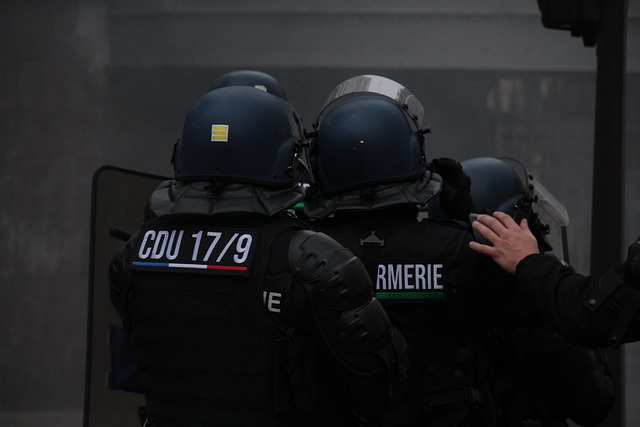Antitrust laws protect fair competition by preventing practices that hinder trade or innovation. Proving guilt beyond reasonable doubt is key, requiring robust evidence of anti-competitive behaviors like price-fixing, market allocation, and monopolization. Lawyers gather complex data, expert testimony, and legal precedents to defend against charges, preserving business integrity while safeguarding individual interests. Landmark cases like Standard Oil (1911) and International Paper Co. (1957) highlight the power of thorough investigations in upholding competition through stringent proof standards.
“Antitrust violation cases play a critical role in maintaining fair market competition. This article delves into the intricacies of antitrust laws, their purpose, and the elements required to prove violations. We explore how to gather evidence to establish intent and impact, understanding legal standards like reasonable doubt, and examining historical examples of notable cases. By the end, readers will grasp the complexities involved in proving guilt beyond reasonable doubt in antitrust litigation.”
- Understanding Antitrust Laws and Their Purpose
- Elements of an Antitrust Violation Case
- Gathering Evidence to Prove Intent and Impact
- Legal Standards: Reasonable Doubt and Beyond
- Historical Examples: Notable Antitrust Cases
Understanding Antitrust Laws and Their Purpose

Antitrust laws are designed to promote fair competition among businesses, ensuring a level playing field for all market participants. These laws aim to prevent companies from engaging in practices that restrict trade or stifle innovation. Understanding antitrust legislation is crucial as it sets the framework for investigations and enforcement actions. The primary goal is to protect consumers by fostering healthy economic competition, preventing monopolies, and encouraging the free flow of goods and services.
The key to successful prosecution in high-stakes cases lies in proving guilt beyond a reasonable doubt. This standard of evidence is essential throughout all stages of the investigative and enforcement process. Prosecutors must gather compelling evidence, build a robust case, and present it in a way that leaves no reasonable doubt about the violation. Winning challenging defense verdicts requires a deep understanding of antitrust principles and the ability to navigate complex legal strategies often employed by corporate defendants in these sensitive matters.
Elements of an Antitrust Violation Case

In an antitrust violation case, proving guilt beyond reasonable doubt is paramount. This involves demonstrating that a corporation or individual has engaged in anti-competitive practices that substantially harm market competition. Key elements include establishing a relevant market, identifying the defendant’s actions as anti-competitive, and quantifying the resulting damages to consumers and competitors. The focus is on actions like price-fixing, market allocation, and monopolization, where the intent to stifle competition is clear.
For his clients involved in antitrust litigation, a robust general criminal defense strategy is essential. This includes thorough fact-finding, expert testimony, and legal arguments that challenge the prosecution’s case. The goal is not just to defend against charges but also to protect the interests of both corporate and individual clients. By presenting a compelling defense, attorneys can ensure fairness and safeguard their clients’ rights in these complex legal battles.
Gathering Evidence to Prove Intent and Impact

Proving guilt beyond reasonable doubt is a key aspect of any antitrust violation case. To secure a successful outcome for his clients facing such charges, legal professionals must meticulously gather and present evidence that establishes both intent and impact. This involves sifting through complex financial records, witness testimonies, and industry data to uncover anti-competitive behaviors, such as price fixing or market division, which harm consumers and distort fair market dynamics.
A comprehensive strategy is essential for achieving a complete dismissal of all charges. By employing expert witnesses, analyzing relevant legal precedents, and presenting clear, irrefutable evidence, defense attorneys can challenge the prosecution’s case and demonstrate that their clients acted within the bounds of the law. This approach not only protects the interests of the individuals involved but also ensures the integrity of economic systems by distinguishing legitimate business practices from white-collar and economic crimes.
Legal Standards: Reasonable Doubt and Beyond

In antitrust violation cases, establishing guilt goes beyond the traditional “beyond a reasonable doubt” standard employed in many legal proceedings. This heightened level of scrutiny requires prosecutors to present compelling evidence that conclusively demonstrates a company’s involvement and intent to violate antitrust laws. The bar is set high because these cases often involve complex economic behaviors and structures, making it critical to prove not just an action but also its malicious or anti-competitive purpose.
An unprecedented track record of illegal activities, consistent patterns of behavior, or the lack of legitimate business justification for seemingly suspect actions can sway a jury toward finding guilt. Moreover, evidence from influential sources within or outside the company, such as former executives or industry analysts, can significantly contribute to proving intent. Ultimately, avoiding indictment in these cases demands a meticulous defense strategy that not only challenges the evidence but also provides a compelling narrative of legitimate business practices within the philanthropic and political communities affected by the alleged violations.
Historical Examples: Notable Antitrust Cases

In the history of antitrust law, several notable cases have showcased the power of these regulations in promoting fair competition and protecting consumers. One of the earliest and most famous examples is United States v. Standard Oil (1911), where the U.S. Supreme Court ruled that Standard Oil’s monopolistic practices violated antitrust laws. This case set a precedent for proving guilt beyond reasonable doubt, as the jury trials revealed intricate web of business tactics designed to suppress competition.
Another significant moment came with International Paper Co. v. United States (1957), which involved a massive conspiracy among paper companies to fix prices and allocate markets. Achieving extraordinary results, the investigative and enforcement process unraveled this complex scheme, demonstrating the effectiveness of antitrust laws in addressing large-scale conspiracies. These historical examples highlight the importance of robust investigations and the need to meet the burden of proof beyond reasonable doubt in antitrust violation cases.
In the pursuit of fair market competition, understanding and enforcing antitrust laws are paramount. By recognizing the key elements of an antitrust violation case, effectively gathering evidence, and applying the legal standard of proving guilt beyond reasonable doubt, justice can be served. Historical examples highlight the significance of these cases in shaping business practices, ensuring that companies adhere to ethical standards and maintain a level playing field for all participants in the marketplace.






